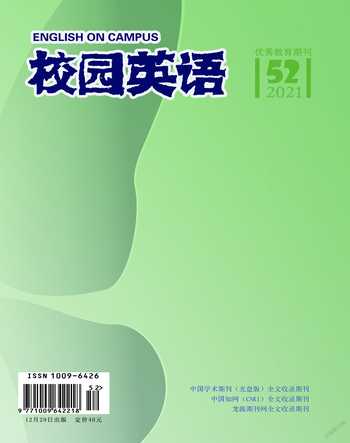“課程思政”英譯評析
【摘要】本文對國內主流外語語言類學術期刊近年來所刊發相關主題文章中關鍵詞“課程思政”的代表性英譯文本進行評析。研究表明,所收集文本均采用了“意譯”策略,譯文存在多樣性。文章還借助英語詞典和美國當代英語語料庫(COCA)對部分譯文選詞進行了探討。
【關鍵詞】課程思政;意譯;措辭
【作者簡介】石教旺(1978-),男,湖北陽新人,浙江科技學院外國語學院教師,講師,碩士,研究方向:大學英語、跨文化交際等教學。
一、引言
“課程思政”作為當下中國教育領域的“熱詞”,人們對其英譯表述似乎尚未達成共識。在中國文化走出去的背景下,結合當前發生在中國教育領域的這場“變革”,準確翻譯這一術語,有助于英語教學實踐和文化交流。
二、“課程思政”英譯評析
1.譯文收集。筆者通過中國知網(CNKI),對《外語界》《外國語》《外語教學》《中國外語》《外國語文》《外語電化教學》等國內主流外語語言類學術期刊以“課程思政”為關鍵詞進行檢索,收集到近年來所發相關主題文章對該詞的代表性英譯如下:morality cultivation,morality cultivation in course instruction,curricula of integrated ideology and politics,ideological and political education,courses with ideological-political elements,integrating moral education into(foreign language)education,ideological-political education in non-ideological-political courses,value education through courses,implementing ideological and political education in all courses,the ideological and virtue awareness,all-course-based ideological and political education,curriculum-based political and virtuous awareness等。
2.譯文文本分析。從以上所收集文本可以看出,“課程思政”的譯文呈現多樣性。研究者基于各自的理解,對“課程思政”一詞給出了不盡相同的英譯。有時,同份刊物同期所發文章對該詞的英譯表述也幾乎各異,如收集的《中國外語》2021年第2期的幾篇文章對“課程思政”的翻譯各不相同。
從文本結構上看,以上譯文大致可分為三類:第一類譯文中心詞為名詞“課程”對應詞匯,如course with ideological-political education,courses with ideological-political elements,curricula of integrated ideology and politics。這樣處理有讓英語讀者誤解為政治意識形態類課程之嫌。第二類中心詞為名詞“教育”“培育”等對應的詞匯,如morality cultivation,ideological and political education,value education through courses,all-course-based ideological and political education等。譯文表明了“課程思政”的教學和育人屬性,但是部分譯文用詞可進一步探討。第三類中心詞匯為動名詞短語,體現在integrating moral education into(foreign language)education和implementing ideological and political education in all courses兩譯文中。動名詞的使用提示了“課程思政”的“實踐活動”屬性。
3.翻譯策略及評析。分析發現,所收集的代表性譯文均沒有采用直譯(literal translation),而無一例外都采取了意譯(free translation)的策略。如果把“課程思政”一詞拆分,可以得到“課程”和“思政”兩個部分。“課程思政”的直譯表述應為curriculum/course ideology and politics。所收集到的譯文中無此表述。
morality cultivation的表述最為簡潔。Collins在線詞典給出morality的義項有“the belief that some behavior is right and acceptable and that other behavior is wrong”,即“對某種行為是正確的、可以接受的,而其他行為是錯誤的(不可接受的)信念信仰”。morality cultivation類似于西方的moral education,譯者沒有采用“異化”(foreignization/alienization)的翻譯方法,而是借助同義替換的方式來和moral education相區別。需要指出的是,在COCA(美國當代英語語料庫)中,沒有檢索到morality cultivation的記錄。
morality cultivation in course instruction中instruction顯得冗余,去掉可使譯文更簡潔而不影響理解。因為現代教育對“課程”的理解存在多面性,如:課程就是教學科目,是學習結果或目標,是教育/學習計劃,是經驗等認知。 所以,此處course后不必添加表示教學的表述。
ideological and political education的翻譯也比較簡略,但未能體現思政課與非思政課的區別。雖然“課程思政”是全部課程的要求,但著重強調的是非“思政課程”的“思政”育人要求。
curricula of integrated ideology and politics和courses with ideological-political elements用了課程的復數形式curricula/courses, 強調了所有課程均是“課程思政”的載體。前者用integrated提示課程中“整合”進思政內容,課程有機融合“思政”,而后者用with加elements的結構,揭示各課程加入思政“元素”的要求。
all-course-based ideological and political education和ideological-political education in non-ideological-political courses二者采用了“增譯法”(amplification),前者強調了“課程思政”中“全課程”立德樹人的理念,后者則側重于“非思政課程”的“隱性”思政教育。
implementing ideological and political education in all courses和integrating moral education into(foreign language)education二者采用動名詞形式,強調“課程思政”是教育實踐,突出了這一理念的貫徹需要教育工作者充分發揮主觀能動性,認真挖掘每門課程的思政元素,并切實融入教學。
curriculum-based political and virtuous awareness表述與其他譯文相比,沒有出現ideology/ideological、education/instruction等詞匯,而選擇了virtuous和awareness。Collins在線詞典中,virtuous的解釋有“conforming to moral and ethical principles; morally excellent; upright”,即“符合道德倫理準則的,道德高尚的,正直誠實的”;ideology指“the doctrines, opinions, or way of thinking of an individual, class, etc.; specif., the body of ideas on which a particular political, economic, or social system is based”,即“個人、階級等的信條、觀念觀點;具體來說,指特定的政治、經濟或社會體系以之為基礎的主體思想觀念”。可見,virtuous 指代的意義包含在ideological中。Merriam-Webster在線詞典解釋awareness為“the quality or state of being aware : knowledge and understanding that something is happening or exists”(對事物性質或狀態的意識,對某事正在發生或存在的認識和理解)。中文一般譯做“意識”“認知”等。譯文沒有用education/instruction等詞匯而用awareness,提示課程要有“思政意識”,同時也巧妙地提示“課程思政”不是“顯性”地去“灌輸”“填塞”,而是“隱性”地去“喚醒”“影響”,幫助學生形成正確的思想政治意識和道德倫理觀念,形成師生對真善美的共同體驗和情感共鳴。(另外,譯文the ideological and virtue awareness若用形容詞virtuous代替名詞virtue來和ideological保持一致,結構看起來似乎更合理。)在COCA中,沒有檢索到virtue awareness和virtuous awareness的記錄,而political awareness的記錄有141條。因而,調整為curriculum-based virtuous and political awareness不失為一種選擇。
在譯文value education through courses中,用value表述“思政”。依據Macmillan在線詞典,values指“the principles and beliefs that influence the behaviour and way of life of a particular group or community”,意為“影響特定人群、團體的行為、生活方式的原則和信仰”;Collins在線詞典指出,values在英國英語中指“the moral principles and beliefs or accepted standards of a person or social group”,即“個人或社會群體的道德準則、信仰或可接受的標準”,在美國英語中指“the social principles, goals, or standards held or accepted by an individual, class, society, etc”,也即“個人、階層或社會團體等所接受和奉行的社會準則、目標或標準”。據此分析,values的英文含義基本傳遞了“思政”所要表達的思想。那么在此,“課程思政”的英文表述該用單數value還是復數values呢?根據COCA的檢索結果,values education搭配出現67次(學術領域27次,其中教育領域15次),value education出現85次(學術領域18次,其中教育領域9次)。據此是否可以判斷此條“課程思政”譯文用value是更佳選擇呢?不盡然。進一步追蹤這些搭配的來源,發現在教育領域,value education搭配中value更多做動詞用,做名詞用的只有2次,占比22%;而values education搭配中value當名詞用的有14次,占比93%。可見,該條譯文用values education更符合英語的表達習慣,如COCA中例子:“Alexander called for values education in terms of teaching appropriate behaviors...”;“they both emphasize values education, empowerment and active citizenship...”,等等。因而,此條譯文用values代替value應為更佳選擇。
三、結語
學者們對“課程思政”的英譯采取了見仁見智、不盡相同的表述。相對于直譯,意譯的策略被認為能夠更好傳遞該詞所包含的豐富信息。雖與一些術語的英譯最終由權威部門統一口徑以避免政治上的誤解和曲解不同,筆者認為,由相關權威部門和專家對這一“熱詞”的英譯進行規范,力爭使譯文既能夠表明“思政”屬性,又能夠體現中國特色,將有利于英語教學實踐及文化交流。
參考文獻:
[1]徐錦芬.高校英語課程教學素材的思政內容建設研究[J].外語界,2021(2):18-24.
[2]劉正光,岳曼曼.轉變理念、重構內容,落實外語課程思政[J].外國語,2020(5):21-29.
[3]楊金才.新時代外語教育課程思政建設的幾點思考[J].外語教學,2020(6):11-14.
[4]李欣,馮德正.商務英語專業課混合教學的“課程思政”行動研究[J].外國語文,2021(2):19-26.
[5]黃國文.思政視角下的英語教材分析[J].中國外語,2020(5):21-29.
[6]文秋芳.大學外語課程思政的內涵和實施框架[J].中國外語,2021(2):47-52.
[7]常晨光,周慧,曾記.國別與區域研究課程中的課程思政——理念與實踐[J].中國外語,2021(2):78-83.
[8]羅良功.外語專業課程思政的本、質、量[J].中國外語,2021 (2):60-64.
[9]丁鳳,王蘊峰,歐陽護華,梁靜璧,潘春梅,馮蔚.全人教育理念下的課程思政——以“交際英語”課程為例[J].中國外語,2021(2):91-96.
[10]王欣,陳凡,石堅.價值引領下的英語專業課程群思政建設[J].中國外語,2021(2):65-70.
[11]姜智彬.“多語種+”:課程思政背景下外語人才培養的內涵、路徑與成效[J].外語電化教學,2020(4):18-21,3.
[12]蔡基剛.課程思政視角下的大學英語通識教育四個轉向:《大學英語教學指南》(2020版)內涵探索[J].外語電化教學,2021(1):27-31,4.
[13]鐘啟泉,汪霞,王文靜.課程與教學論[M].上海:華東師范大學出版社,2008.
3278500338254

